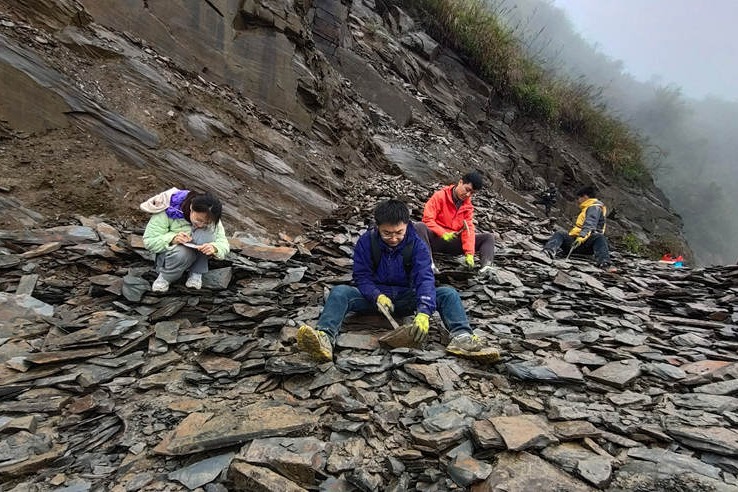Upgraded countryside venues provide services tailored for particular clientele

Increased demand for rural homestays is spurring efforts to offer upgraded accommodations tailored to particular groups of visitors.
Homestay owners from Linzhou, Henan province, meet from time to time at a recently built training center to discuss ways to improve their businesses.
Some of the owners want to learn how to attract visitors online, while others are seeking to upgrade their properties to lure guests.
Song Haiou, who opened his homestay in Linzhou in 2017, said, "I have spent more than 10,000 yuan ($1,398) on books related to homestay design, construction, management and operations."
He was among dozens of local homestay owners at the training center, which was jointly established this year by the local authorities and the online travel agency Trip.com Group.
Tourism industry experts have been invited to the center to offer advice to local homestay owners, while the owners of such businesses in other areas of the country have been welcomed to exchange ideas.
Li Hai, chairman of the Linzhou Homestay Association, said, "Local homestay development in recent years has really taken off."
Rural restaurants started to emerge in Linzhou in the 1990s, and as visitors prolonged their stays in the area, these businesses began to offer accommodations, Li said.
In 2016, when it was rated a leading national scenic spot, more travelers headed to Linzhou to visit Taihang Grand Canyon. Many of them were art students and artists who came to sketch and paint the stunning natural scenery. Local homestay owners improved their services to meet the rising demand.
Li said, "A clear understanding of the tourism market and the scientific development of local tourism resources are behind the homestay success in Linzhou."
Yang Xian, who lives in Shibanyan town, Linzhou, spotted a business opportunity several years ago when he saw some artists experiencing difficulty in finding accommodations in the area.
From a rural homestay offering local food, Yang's business has expanded and now provides catering, accommodations and training for artists. He said his annual income has reached 1 million yuan ($144,900).
Meanwhile, Song Haiou, a former architect, caters to guests at his homestay in Shibanyan. The guests share Song's background, and he provides numerous architectural books and also stages events targeted for his clientele. The business has been fully booked during holidays in recent years.
Its proximity to Taihang Grand Canyon helps Shibanyan attract visitors, more than 80 percent of whom flock to the area for leisure pursuits and to take care of their health.
There are now more than 650 homestays in Linzhou, and these businesses offer some 10,000 beds, according to the local authority.
The market's potential has also drawn major players in the industry such as Trip.com Group to work with the local government in developing upscale homestays in Linzhou.
Dai Gangming, who runs the rural homestay Trip.com Group Country Retreat in Shibanyan, has witnessed the business' growing popularity since it opened in March.
"We have attracted a group of patrons who frequently visit the homestay," Dai said.
The business, which has tapped the local farming culture and intangible cultural heritage, offers related immersive experiences.
During their stay, visitors try out farming tools and view paintings featuring local agriculture. The homestay also arranges for guests to plant saplings, apply fertilizers, remove weeds and harvest vegetables.
Jiang Jiding, head of the Henan Culture and Tourism Department, said, "Linzhou is a typical model for homestay development in Henan."
The training and promotional efforts being made by Linzhou and tourism industry players such as Trip.com Group will point the way for homestay operations across Henan, Jiang added.
Since 2018, the Henan Culture and Tourism Department has encouraged owners of old local residences to transform their properties into quality homestays in line with the nation's focus on such businesses to propel rural vitalization and economic recovery.
By 2025, a rural homestay development pattern featuring appropriate distribution and scale, distinctive elements and quality service is expected to take shape, according to a recent guideline jointly issued by 10 central government departments, including the Ministry of Culture and Tourism, the Ministry of Natural Resources, and the National Rural Revitalization Administration.
The guideline states that development of rural homestays will be included in overall planning for the tourism industry, land management and economic development. Design and construction work for homestays is encouraged to include elements of local customs and natural scenery.
Industry associations, vocational schools and companies are also urged to channel their resources to help train talent in homestay design, construction, management and services, according to the guideline.
Dai Bin, president of the China Tourism Academy, said rapid development of the homestay industry is supported by people's pursuit of a better life.
During the pandemic, short trips have become increasingly popular, Dai said.
Such journeys have boosted homestay development, which has been further fueled by increased manpower and improved internet technology connecting homestay suppliers and consumers, Dai added.
Today's Top News
- Nation gears up for Spring Festival rush
- Premier calls for stronger economic cooperation
- Xi, Starmer envision growth of ties
- Long-term, consistent comprehensive strategic Sino-UK partnership benefits both and world
- Xi calls on China, Britain to jointly advocate, practice true multilateralism
- Xi says China will never pose threat to other countries no matter how it grows






























